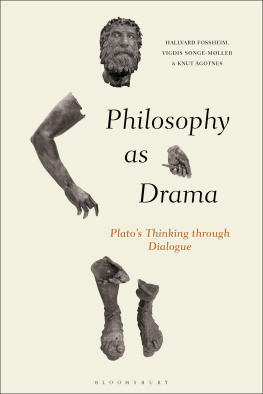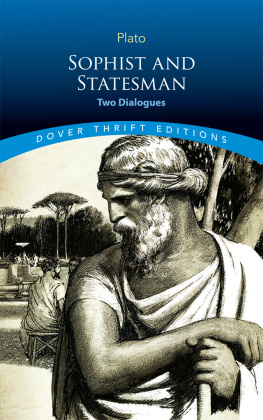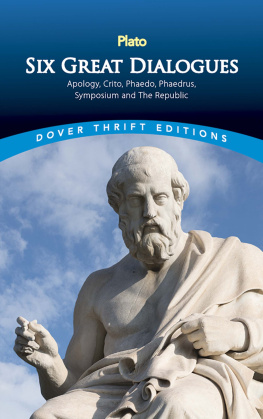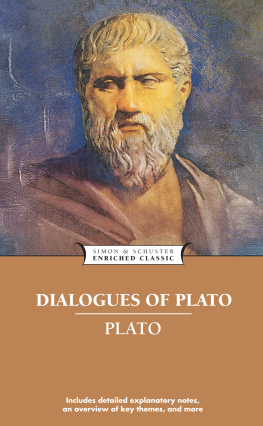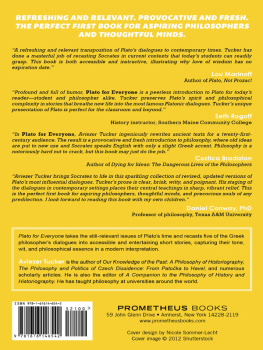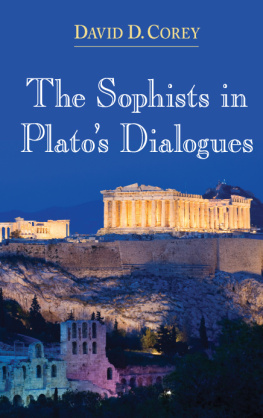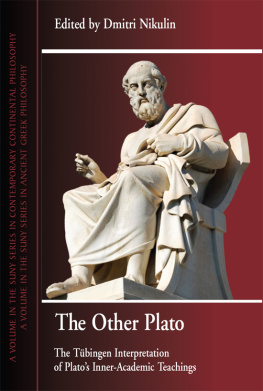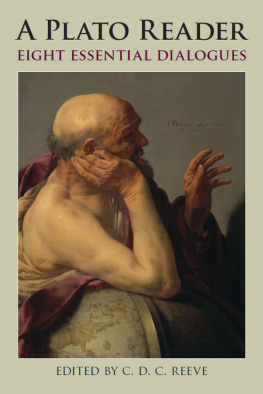
Philosophy as Drama
Also available from Bloomsbury
Plato and Nietzsche, Mark Anderson
Parmenides, Plato and Mortal Philosophy, Vishwa Adluri
Health and Hedonism in Plato and Epicurus, Kelly E. Arenson
Rethinking Order, edited by Nancy Cartwright and Keith Ward
Aesthetics of Ugliness, Karl Rosenkranz
Plotinus the Platonist, David J. Yount

Contents
Hayden W. Ausland is Professor of Classics at the University of Montana. His publications include: Socrates in the Early Nineteenth Century, Come to Be Young and Beautiful, forthcoming in Brills Companion to the Reception of Socrates; The Treatment of Virtue in Platos Protagoras, in Platos Protagoras. Essays on the Confrontation of Philosophy and Sophistry (2017); The Decline of Political Virtue in Republic 89, Proceedings of the Boston Area Colloquium in Ancient Philosophy (2013); Socratic Induction in Plato and Aristotle, in Dialectic and Dialogue. The Development of Dialectic from Plato to Aristotle (2012); Promial Prolepsis in Platos Politeia, Symbolae Osloenses (2008).
Erlend Breidal has been a philosophy teacher at the University of Bergen for more than a decade and wrote a PhD on Plato in 2015, entitled The Intermediate Being of Socratic Philosophy and its Suppression in Platos Theaetetus, Sophist, and Statesman.
Hallvard Fossheim is Professor of Philosophy at the University of Bergen. He has published widely on Plato and Aristotle, focusing much of his work on their moral psychology, with inquiries into questions of motivation, interaction and identity. He also has interests in virtue ethics and research ethics, as well as questions of dialectic and dialogue. He has recently co-edited the anthology The Quest for the Good Life: Ancient Philosophers on Happiness (2015).
Cynthia Freeland is Professor Emerita of Philosophy at the University of Houston. She is past president of the American Society for Aesthetics (201517). Her publications include articles and books on ancient philosophy, feminist theory, film theory and aesthetics. Her book But Is It Art? (2001) has been translated into fifteen languages. Her most recent book was Portraits and Persons (2010).
Jacob Howland is McFarlin Professor of Philosophy at the University of Tulsa. His research focuses on ancient Greek philosophy, history, epic and tragedy; the Hebrew Bible and the Talmud; Kierkegaard; and literary and philosophical responses to the Holocaust and Soviet totalitarianism. His books are Glaucons Fate: History, Myth, and Character in Platos Republic (2018); Plato and the Talmud (Cambridge University Press, 2011); Kierkegaard and Socrates: A Study in Philosophy and Faith (2006); The Paradox of Political Philosophy: Socrates Philosophic Trial (1998); and The Republic: The Odyssey of Philosophy (1993 and 2004).
Drew A. Hyland is Charles A. Dana Professor Emeritus at Trinity College in Hartford, CT. He has also taught graduate courses at University of Toronto, The New School for Social Research, Boston University, and Suffolk University. His major research areas are Ancient Greek Philosophy, nineteenth and twentieth century European philosophy, and philosophy of sport. Among his major publications are Finitude and Transcendence in the Platonic Dialogues (1995), Questioning Platonism: Continental Interpretations of Plato (2004), and Plato and the Question of Beauty (2008).
Elena Irrera is Senior Research Fellow in Political Philosophy at the University of Bologna. She is also member of Instituto Lucio Anneo Sneca of Universidad Carlos III de Madrid. Her research interests concern aspects of ancient philosophy and contemporary political thought. Her publications include two books: Il bello come causalit metafisica in Aristotele (Beauty as Metaphysical Causation in Aristotle, 2011) and Sulla bellezza della vita buona. Fini e Criteri dellagire umano in Aristotele (On the Beauty of the Good life. Aims and Criteria of Human Agency in Aristotle, 2012), as well as several articles on Platos and Aristotles political thought.
Jens Kristian Larsen is a Marie Skodowska-Curie Fellow at the University of Bergen. His primary area of research is ancient philosophy, with a particular emphasis on Socratic philosophy and Plato. He also works on the reception of themes from ancient philosophy in the phenomenological tradition and is currently co-editing an anthology focused on this reception. His most recent published papers are Measuring Humans Against Gods: On the Digression of Platos Theaetetus (2019), By What Is the Soul Nourished? On the Art of the Physician of Souls in Platos Protagoras (2017), and Plato and Heidegger on Sophistry and Philosophy (2016).
Gro Rrstadbotten teaches philosophy at the Department of Philosophy, University of Bergen, Norway. She is the co-author of the books Tidslinjer (Time Lines, 2008) and Fortiede alternativer (Silenced Alternatives, 2015). Her most recent articles are Turning Towards Philosophy: A Reading of Protagoras 309a1-314e2, in Platos Protagoras. Essays on the Confrontation of Philosophy and Sophistry (2017) and Socratess Telling of the Truth: A reading of the Apology 17a1-35d9, in Readings of Platos Apology of Socrates. Defending the Philosophical Life, (2018).
John Sallis is Frederick J. Adelmann Professor of Philosophy at Boston College. He has also held Chairs at Pennsylvania State University, Vanderbilt University, Loyola University of Chicago, and Duquesne University. He is the author of more than twenty books; among the most recent are Logic of Imagination (2012), Senses of Landscape (2015), The Figure of Nature (2016) and The Return of Nature (2016). His books have been translated into many languages including French, German, Spanish and Chinese.
Kristin Sampson is Associate Professor at the Department of Philosophy at the University of Bergen, Norway. She is working mainly within the areas of ancient Greek philosophy and feminist philosophy, with a special focus on Plato and early Greek thinking previous to him. Her later publications on Plato include articles on the Sophist (2015), the Protagoras (2017), and the Apology (2018).
Vigdis Songe-Mller is Professor Emerita at the Department of Philosophy at the University of Bergen, Norway. Her area of research is ancient Greek philosophy, especially the pre-Socratics and Plato, and Greek tragedy, as well as contemporary feminist philosophy. She is the author of Philosophy Without Women. The Birth of Sexism in Western Thought (2002) and co-author of Sexuality, Death and the Feminine. Philosophies of Embodiment (2010).
Paul Woodruff teaches philosophy and classics at the University of Texas at Austin. He has been working on ancient and modern theories of the virtues. His best-known book is Reverence: Renewing a Forgotten Virtue (2nd edition, 2014). He has recently edited a volume of essays by philosophers on Oedipus in the plays of Sophocles.
Knut gotnes is Associate Professor Emeritus at the University of Bergen. His main interests are Plato and Aristotle, especially the dramatic form of Platos dialogues and his ethics. Recent papers are Platos Socrates in the Apology: Speaking in Two Voices in
Next page
